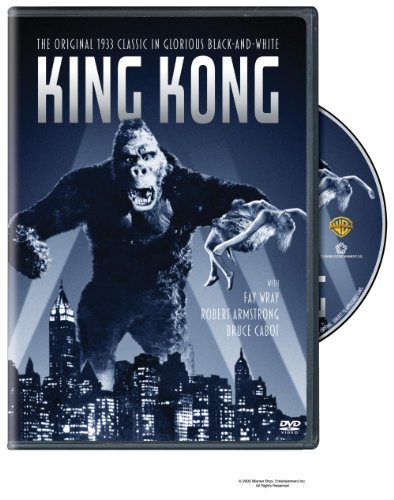Top Ten: Motion Picture Music Treasures Part 3 King Kong
Ever since silent pictures were shown with live organ accompaniment, music has been an important asset in enhancing the dramatic development of a cinematic story.
A truly magnificent motion picture score not only enriches the viewing experience, it becomes inextricable: completely genuine and deeply immersed in its subject matter. The composers of these scores have demonstrated an uncanny gift of knowing how to perfectly capture the emotional heart of the story, influence the narrative's pace, and enter and exit with amazing precision. They boldly tell us through their considerable skill, what the visuals alone cannot begin to describe but nevertheless take nothing away from them. (For a further introduction on this subject please see: Top Ten: Motion Picture Music Treasures Part 1.)
(They are listed in alphabetical order)
King Kong (1933)
Composer: Max Steiner
In 1933, King Kong was an audaciously bold and brazen cinematic tale requiring revolutionary, state of the art visual and sound effects. It would also demand an equally groundbreaking musical accompaniment. This would be no easy going, vegan-friendly ape story to underscore: Kong would fight prehistoric beasts, instil terror, cause ritual sacrifice amongst the jungle natives and, especially in the film's restored version, stomp and chew those who crossed him in the grisliest possible manner. The Austrian-born composer Max Steiner (who studied composition with Gustav Mahler and took piano lessons from Johannes Brahms when Steiner was a child) was destined to compose what some consider to be the first fully orchestral score written for the medium. He subsequently delivered a composition as complex, large and ferocious as the great beast himself. The music was internationally hailed by classical music critics as a brilliant stand alone work. It uniquely captured the avant-garde sounds of modern 20th Century influences represented by Le Sacre du printempts, Stravinsky's controversial ballet opus, which had its premiere two decades earlier. More importantly for cinema enthusiasts, this grand contribution brought a relatively new and exciting musical language to the art of film-making. This, coming from a composer who would, ironically, become characterised by his romantically inspired lush, sweeping thematic material, so liberally spread throughout scores such as Gone with the Wind and Now, Voyager.
King Kong has another trait unusual for Steiner who typically likes to be heard (quantitatively speaking): the lack of any music present until the narrative is well underway. When the score does emerge, as a ship approaches Skull Island, its mysterious tranquility will sharply contrast the feverish dance rhythms heard later during our first glimpse of the natives. That's nothing, however, compared to the aural assault we experience when first encountering Kong himself and some of the other resident prehistoric inhabitants.
Although King Kong's music is predominately aggressive, Steiner transitions to calmer surroundings with the ease of a master's touch. He also provides a superb Wagnerian-like resolution at the film's end, to highlight Kong's demise and the narrative's emotional subtext of romantic tragedy.
It may have been beauty that killed the beast, but it's Max Steiner who brought him magically to life.
A.G.
King Kong is available on Blu-ray here:
It is also available on DVD:
Its original soundtrack can be purchased here:
There is also a 1976 re-recording with far greater audio fidelity. Fred Steiner conducts the National Philharmonic Orchestra. It is currently available from Screen Archives Entertainment here:



